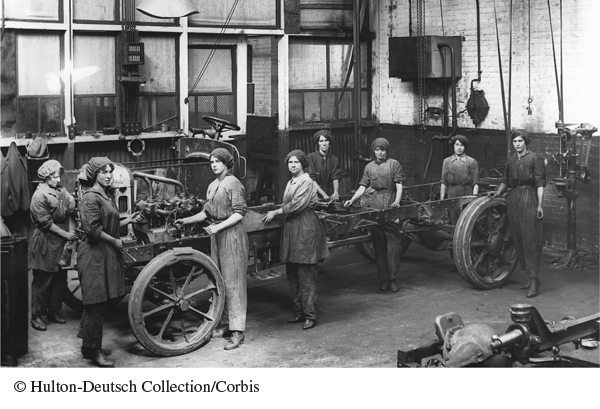A History of Western Society: Printed Page 843
A History of Western Society, Value Edition: Printed Page 810
A History of Western Society, Concise Edition: Printed Page 842
The Social Impact
The social changes wrought by total war were no less profound than the economic impact, though again there were important national variations. National conscription sent millions of men to the front, exposing many to foreign lands for the first time in their lives. The insatiable needs of the military created a tremendous demand for workers, making jobs readily available. This situation — seldom, if ever, seen before 1914, when unemployment and poverty had been facts of urban life — brought momentous changes.
The need for workers meant greater power and prestige for labor unions. Unions cooperated with war governments on workplace rules, wages, and production schedules in return for real participation in important decisions. The entry of labor leaders and unions into policymaking councils paralleled the entry of socialist leaders into war governments. Both reflected a new government openness to the needs of those at the bottom of society.
The role of women changed dramatically. The production of vast amounts of arms and ammunition required huge numbers of laborers, and women moved into skilled industrial jobs long considered men’s work. Women became highly visible in public — as munitions workers, bank tellers, and mail carriers, and even as police officers, firefighters, and farm laborers. Women also served as auxiliaries and nurses at the front. (See “Individuals in Society: Vera Brittain.”)
The war expanded the range of women’s activities and helped change attitudes about proper gender roles, but the long-
To some extent, the war promoted greater social equality, blurring class distinctions and lessening the gap between rich and poor. This blurring was most apparent in Great Britain, where the bottom third of the population generally lived better than they ever had, for the poorest gained most from the severe shortage of labor. Elsewhere, greater equality was reflected in full employment, distribution of scarce rations according to physical needs, and a sharing of hardships. In general, despite some war profiteering, European society became more uniform and egalitarian.

Death itself had no respect for traditional social distinctions. It savagely decimated the young aristocratic officers who led the charge, and it fell heavily on the mass of drafted peasants and unskilled workers who followed, leading commentators to speak of a “lost generation.” Yet death often spared highly skilled workers and foremen. Their lives were too valuable to squander at the front, for they were needed to train the newly recruited women and older unskilled men laboring valiantly in war plants at home.